Most prenatal vitamins are designed to be taken orally once a day. However, it’s essential to check the back of the bottle to determine how many pills are considered a serving, as many supplements need two pills to be enough. If your doctor determines you need extras of any vitamin or mineral, they might prescribe an extra supplement too.
Unveiling the Benefits of Prenatal Vitamins for Expecting Moms
By: Dr. Maria Cerino - Updated May 13, 20234 - 11 Minute Read

If you are expecting a child or assisting someone pregnant, you must have come across numerous recommendations regarding what to eat for a healthy pregnancy. However, have you received any information about supplements for pregnancy?
In this article, we aim to simplify and clarify the concept of prenatal vitamins to ensure that you feel competent and confident throughout your pregnancy.
Table of Contents:
1. Do prenatal vitamins help with pregnancy?
2. What are the benefits of prenatal vitamins for moms?
3. What happens if you don't take Prenatal while pregnant?
4. When to start taking prenatal vitamins?
5. Prioritize Essential Nutrients When Selecting a Prenatal Vitamin
6. What Are the Benefits of Opting for a Prenatal Vitamin Containing DHA?
7. Comparing Multi-Micronutrient and Iron-Folic Acid Supplementation
8. Potential Side Effects of Prenatal Vitamins: Causes and Prevention
9. Conclusion
10. Frequently Asked Questions
Do prenatal vitamins help with pregnancy?
Despite any misleading information that might be swirling around, prenatal vitamins are extremely important during pregnancy. They can ensure your baby’s appropriate development.
Here’s why: a lack of essential micronutrients during fetal growth is associated with pregnancy complications, low birth weight, birth defects, and stillbirth.

What are the benefits of prenatal vitamins for moms?
During pregnancy, many essential minerals decrease if not supplemented, including calcium, iron, magnesium, selenium, zinc, and possibly chromium and iodine. These micronutrients are a considerable part of the energy production pathways on a cellular level, and they also play essential roles during nerve, bone, and connective tissue development.
Some studies have linked appropriate maternal nutrition with reduced maternal anemia and decreased maternal stress during pregnancy. It’s safe to say that choosing to receive supplementation is a way of supporting your body through a highly stressful experience such as pregnancy.
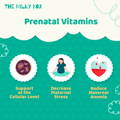
What happens if you don't take Prenatal while pregnant?
The consequences of carrying a pregnancy to term without prenatal vitamin support can vary depending on the micronutrient that makes up for the most significant nutritional gap.
The micronutrients your body utilizes the most during pregnancy: Iron, Folic Acid, Iodine, DHA, and Calcium. They are all unique in the way that they participate in different processes of fetal growth. Here’s a comprehensive breakdown of why they’re so important:
If you’re lacking…
Iron
Iron is key for blood cell production in both mom and baby, the demand increases significantly during pregnancy. Iron deficiency can cause severe anemia in mothers, leading to fatigue, fainting, palpitations, and breathing difficulties. Infants and young children with iron deficiency anemia are at risk of developmental difficulties involving cognitive, social-emotional, and adaptive functions.
Folic Acid
Without enough folic acid, the cells in the neural tube, the precursor to the nervous system, can’t function or grow properly, and the tube doesn’t close. The spine, skull, and brain can be affected, with open or closed abnormalities.
Iodine
Iodine is critical for a woman’s thyroid function during pregnancy. A deficiency of it can cause your baby to suffer from deafness, severe mental disability, stunted physical growth, and stillbirth. Many foods we consume daily are already enriched with Iodine, but there is no harm in ensuring we are getting enough of it.
Calcium
Maternal calcium reserves truly suffer during pregnancy. Not receiving supplementation from the very start of pregnancy can also put you at risk of developing weak bones and teeth, promoting fractures that healthy bones would not suffer from.
Calcium will help your baby’s bones grow properly during the fetal stage. It also provides the necessary blocks for the baby’s teeth. It’s also linked to appropriate blood clotting, protecting both of you against complications during birth.
Other Micronutrients
Other fantastic micronutrients such as B6, Vitamin D, Zinc, and Vitamin C are included in many prenatal. Although these do not make for the most demanded vitamins during pregnancy, it’s still safe to say that your body and your babies need them for proper function and development.
Even during times when eating becomes difficult due to nausea or peculiar cravings, prenatal vitamins will have your back.
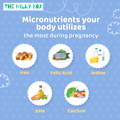
When to start taking prenatal vitamins?
Ideally, prenatal vitamins should be started before conception. Women who are trying to conceive and consult a gynecologist or obstetrician are recommended to start taking them at least three months before conception. Health authorities in many countries recommend women who could get pregnant take 400 mcg of folic acid daily. This is particularly useful in preventing birth defects that affect the baby’s brain and spinal cord.
While in most cases, this rarely occurs, it gives your body time to prepare for pregnancy. It replenishes your vitamin stores, so your nutrition is at its best once it’s time to raise your baby.
However, do not fret. It’s often difficult to prevent these significant life changes while daily life is also going on; it’s completely understandable if you’re not there by the time you get your first positive test.
However, as soon as you get that positive test, or even when you start feeling symptoms, you must get on these prenatal. The less time we wait to get on them, the more we can ensure smooth sailing.
Prenatal Vitamins After Birth
The importance of taking prenatal vitamins after giving birth cannot be overstated. Women are strongly advised to continue taking these vitamins, as they are essential for the mother's well-being and the baby's development. Prenatal vitamins help to replenish the mother's body with vital nutrients, which are necessary for the production of nutrient-rich milk.
Additionally, these vitamins are crucial for the baby's brain development, processing abilities, and visual acuity. Therefore, it is highly recommended that women continue taking prenatal vitamins even after giving birth to ensure a healthy and nourishing start for both the mother and the baby.
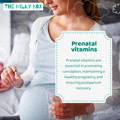
Prioritize Essential Nutrients When Selecting a Prenatal Vitamin
Are there any specific nutrients I should be looking out for in prenatal? The answer is yes.
Ideally, a good prenatal vitamin should include Iron, folic acid, Iodine, prenatal DHA (Omega 3), and calcium. Although most well-known brands make great formulas that are enriching and universal, there’s no harm in consulting your obstetrician in case you need to get tested for any deficiency and need to double down on some of them.
However, here’s the list of the nutrients you should be typically looking out for:
● Folic acid
● iron
● Iodine
● Calcium
● Vitamin D
● Vitamin C
● Vitamin A
● Vitamin E
● B vitamin complex (Thiamin, Niacin, Riboflavin, B12)
● Zinc
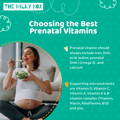
What Are the Benefits of Opting for a Prenatal Vitamin Containing DHA?
You might’ve heard of Omega 3before; this is just another name for DHA. While we constantly hear about the benefits of consuming it as an adult, more recent studies have found it’s necessary even from the womb, as it facilitates neurological and vision development in your growing little one. Omega-3s are also necessary supplements during lactation as they are passed on to babies in the womb and through breastfeeding after birth.
Comparing Multi-Micronutrient and Iron-Folic Acid Supplementation
When prenatal vitamins were established as the norm, we didn’t have as much knowledge as we do now. Folic acid and Iron used to be the only supplements recommended many years ago, but Vitamins B6 and B12, choline, vitamin D, and prenatal DHA are essential for fetal neural tube and brain development.
Folate vs Folic Acid
If you’ve ever wondered why in some sources you see “folate” and in others you see “folic acid” being mentioned, we have the answer for you. It’s easy to get them mixed up as oftentimes they’re used interchangeably, but there’s a key difference between both:
Folate is the name given to all derivates of vitamin B9 such as dihydrofolate and folic acid. Folic acid itself is the synthetic form that has been used for decades to supplement it into our diet. You can find it in bread, breakfast cereals, energy bars and more. It’s extremely important to have adequate consumption because it helps us restore and create new cells.
As mentioned though, more than 40 percent of individuals struggle to properly metabolize the synthetic form due to mutations in their methylation pathway. So, it is best to look for a methylated folate form vs. synthetic.
Folic acid can also be found as an individual supplement, which is what we often see recommended for pregnancy. Taking it along the right amount of other nutrients is key for a healthy pregnancy.
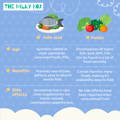
Potential Side Effects of Prenatal Vitamins: Causes and Prevention
Although there aren’t any risks caused by prenatal vitamins, some minor side effects can be hard for some moms. The most common ones are nausea and constipation, although it is sometimes difficult to know if they are caused by the prenatal or the pregnancy itself.
Some prenatal vitamins have been known to cause nausea in some patients. If you’re experiencing severe nausea, you might need to talk to your doctor. They can help you find an alternative, such as chewable or liquid vitamins. Taking them with food is also key to reduce nausea as B vitamins, iron and zinc on an empty stomach will frequently instigate nausea.
Prenatal vitamins that contain higher quantities of iron can also cause constipation. Your physician can also manage this by prescribing some approved stool softeners.
Postnatal Vitamins and Postpartum Nutrition
It is common knowledge that following a healthy and balanced diet is crucial for new breastfeeding mothers, as it impacts both the mother and the baby's well-being.
Breastfeeding alone requires 300 to 400 additional calories daily, more than needed during pregnancy.
The impact of nutrition on a mother and baby's health cannot be overstated. A mother's diet directly affects the quality of her breast milk, which is the primary source of nutrition for her baby.
Postpartum-Bottle Feeding
Mothers who bottle-feed during the postpartum period need to give their bodies time and energy to heal, as well. Proper nutrition is essential for the healing process. Here are ways to support yourself.
● Continue prenatal vitamin during the postnatal period
● Make calcium a nutritional part of your day
● Take a daily iron supplement
● Drink a lot of water to speed recover
A properly balanced diet is crucial for maintaining good health in the present and future. This holds not only for mothers but also for infants.
If you choose to formula feed your baby, it is essential to select a product that contains pure, precise organic ingredients, free from any harmful additives, metals, soy or preservatives.

Conclusion
It is essential for expecting mothers to take prenatal vitamins as they provide crucial nutrients that aid in the development of the baby and replenish the mother's body reserves, leading to faster recovery. To stay healthy and reduce difficult symptoms, it is necessary to maintain a healthy diet throughout pregnancy.
Post-childbirth, a nutritious diet, and support are equally important. The Milky Box provides organic baby formulas with a perfect balance of clean ingredients, giving your baby the best start during their first few days.
Frequently Asked Questions
How often should I take my prenatals?
Should I take my prenatal vitamins with food?
Taking your prenatal with water and a meal is best to avoid an upset stomach. Although there is no “right” time of the day to take them, many moms prefer to take them with breakfast to establish a routine.
Can I take my regular multivitamin instead of prenatal vitamins?
No. While many of the vitamins and nutrients included in a regular multivitamin might be the same, the quantities are not designed to help gestational needs. For this reason, it is much better to stick with the formulas specifically designed for pregnancy.
How will I know if I’m getting enough vitamins?
If you aren’t getting enough nutrients from your diet and your prenatal, you might experience increased levels of fatigue, stress, bleeding, shortness of breath, and inadequate weight loss. If you’re experiencing any of these, please contact your doctor. You might need some tests to determine your nutritional status, and then they will provide adequate extra supplementation.
Disclaimer:
Please be aware that this information is based on general trends in babies, and it is not medical advice. Your doctor should be your first source of information and advice when considering any changes to your child’s formula and when choosing your child’s formula. Always consult your pediatrician before making any decisions about your child’s diet or if you notice any changes in your child.
Breastfeeding is the best nutrition for your baby because breast milk provides your child with all the essential nutrients they need for growth and development. Please consult your pediatrician if your child requires supplemental feeding.

Dr. Maria Cerino is a medical doctor and a researcher from Mexico, her works being published in prestigious journals like the American Journal of Human Biology among others. As a medical writer, Dr. Cerino focuses on infant nutrition and healthy neurological development in infants and children. In her free time, she enjoys going on walks, watching indie films, and cooking at home.
Read Next:
Reviewed by Dr. Eric Wood, ND, MA

Dr. Wood is a licensed naturopathic doctor, with a doctorate degree from the Canadian College of Naturopathic Medicine in Toronto, Canada. He received his post-graduation certification in Mind Body Medicine at Harvard University.
With 15 years of experience, Dr. Wood is an Associate Professor of Holistic Nutrition at the American College of Health Sciences in Portland, Oregon. Dr. Wood is an educator, clinician, author, media figure, consultant, and owns his own holistic (naturopathic) medical practice in Ft. Lauderdale, Florida. Dr. Wood is currently researching and drafting books on cancer and pediatrics.
Outside of the medical profession, Dr. Wood loves singing with the Miami Lyric Opera and is an avid musician in South Florida. He also loves spending time with his wife and kids.

